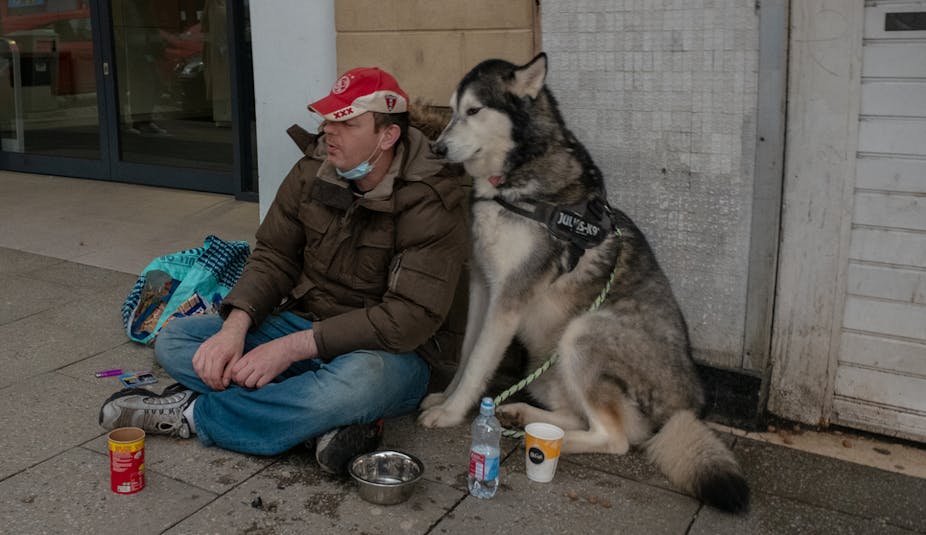Around 8.4 million Britons struggle to get enough to eat, according to the latest figures from the UN, which puts the UK on a par with countries like Latvia and Hungary. This state of affairs is called food insecurity and it has been on the increase since the 2008 financial crisis and the decade of austerity that followed. But in the last year, COVID-19 has made things worse. Because of the pandemic, more people than ever simply do not have enough to eat.
Early figures suggest a quadrupling of food insecurity in 2020 compared to 2018. This varies from worrying about being able to get enough to eat, to having difficulties getting access to food, to actually going hungry.
In “normal” times, this kind of food insecurity is a risk faced by the most vulnerable in society. This includes those on low incomes or living in poverty and people who lack support networks. Women are specifically at risk of food insecurity because they head the bulk of single parent households (86%), which make up the largest number of Trussell Trust food bank users in the UK.
In our recent research, conducted for the UWS-Oxfam Partnership, we explored how the pandemic escalated the scale of food insecurity in the UK. We did so with a focus on four groups across Scotland: the homeless, young carers, asylum seekers and people with disabilities. These groups are more at risk of not having enough to eat, even in normal times. We also looked at the emerging data and research on COVID-19 and the impact the pandemic has had on food insecurity across the UK.
Food insecurity
Through our own and existing research, we established three main factors that have intensified food poverty during the crisis:
1. Rising need driven mainly by loss of or reduction in income.
2. New and growing challenges in getting access to food.
3. The impact of lockdown on the operation of food banks.
We interviewed people from organisations supporting the disabled, homeless, young carers and asylum seekers about how the pandemic affected household finances. For many young carers, lockdown led to immediate loss of employment. Because they are often in low-paid and casual employment, the furlough scheme did not support them. At the same time, the cost of living increased. Travel restrictions made it impossible to travel to shops with cheaper food, so money did not go as far as before when shopping locally.
Disabled people – in particular those told to shield – became more reliant on online shopping. With delivery slots hard to come by and disabled people less likely to have internet access, doorstep services also came with additional costs.
Glasgow has the largest number of dispersed asylum seekers (3,756) per head of population in the UK and most were relocated into hotels with full-board accommodation at the start of the pandemic. This meant they lost their limited cash entitlement, were dependent on hotel meals and unable to buy the food they needed for health or cultural reasons.
Lockdown challenges
COVID-19 exposed the vulnerability of the UK’s food system to the sharp shock of pandemic conditions. Research in 2020 noted that the UK food system was dominated by “just-in-time” supply chains, which were severely challenged by stockpiling and panic buying in the first weeks of the pandemic.
Lockdown also demonstrated how vulnerable the UK’s emergency food aid system is and the devastating consequences of food bank closures. In other words, the pandemic showed how quickly food access problems can emerge. The rules around shielding and self-isolation only compounded the situation.
Local authorities delivered food boxes to vulnerable people’s homes, but there was mixed success in terms of quality, quantity and reliability. We discovered that many homeless and disabled people did not hold official “shielder” status despite serious health conditions, which meant they were excluded from food box schemes.
All these issues show how access and income challenges overlap to have a serious impact on availability of food to those who need it most. While rising food insecurity meant a rise in demand for food aid, food banks were forced either to close or reorganise to comply with social distancing and lockdown rules. COVID-19 and its shielding requirements meant that many older volunteers could no longer help out at food banks and so were lost just when they were really needed.
The many food aid services which continued working during lockdown drastically changed how they operated. They became large-scale food delivery services instead of drop-in places. This was a huge problem for many of their users. For example, we heard how food banks are important for the homeless and young carers because they offer an escape from isolation. They are also places to find benefit advice and mental health support. All of this disappeared with the lockdown.
Preparation and resilience
Despite the best efforts of food banks, the crisis showed that the emergency food aid sector was ill-equipped to deal with the surge in food insecurity created by COVID-19.
The best approach to dealing with food insecurity, both in normal times and in times of crisis, is to make sure that people have enough money to buy the food they need. Financial resilience is key. Better preparations for supplying those who cannot access food despite having the financial means are also required.
The Right to Food movement, which advocates to enshrine in law people’s right to proper food is gaining momentum. Perhaps the crisis will prompt policy change – certainly, some public attitudes research suggests that the British public is open to a stronger social security system.
Devolved administrations have also used their powers to make more funding available to support unpaid carers and increase crisis grant budgets. These governments can also make the changes needed to help homeless people. Asylum seekers should also be included in the advocacy happening across the UK, to anchor the “right to food” in law. Perhaps then food insecurity will become a thing of the past.

